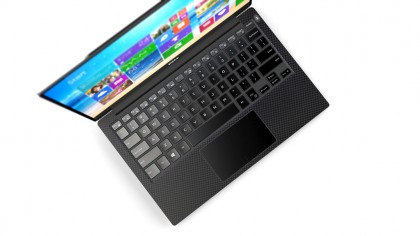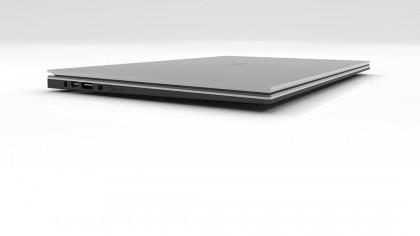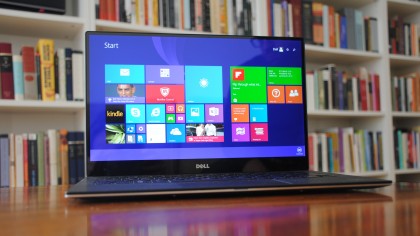
Precision inputs
With a smaller chassis, Dell had to make some inevitable tweaks to the system's keyboard to match up with the smaller dimensions. Other than slightly tweaking the arrangement and spacing between the keys, Azor said his team didn't have to make many changes with the mechanics of the keyboard and that it even features the same amount of travel.
However, the Texas-based computer maker needed to address the customer and press dissatisfaction with the trackpad on last year's model. The XPS team introduced improvements in the mechanical and electrical elements behind the hardware, along with little bit of tweaking of the drivers as well around sensitivity after researching which profiles were most popular with customers.
Along with its own internal tweaks, Dell worked closely with Microsoft on its Precision Touchpad initiative.
"When you use this device you have all the touch functionality you want with Windows 8.1 on the touchpad," Azor quipped. "You can swipe in from the sides, pinch and zoom, and also scrolling."
"Scrolling has been one of the biggest weaknesses to PC touchpads and we spent a lot of time with the two finger scroll to make sure it was going to give a superior experience both horizontally and vertically," he continued. "We really treated this as a sub product category of its own in our development effort."

More power, less drain
Internally, there have been quite a number of changes since last year's Dell XPS 13. The new model is most notably powered with an Intel Broadwell processor that promises to deliver more performance and better battery life.
"Because the process efficiencies and die shrink [of Broadwell], it can run on lower power for longer and still give you the same level of performance as a Haswell chip without having to consume more battery life," Azor explained.
Sign up for breaking news, reviews, opinion, top tech deals, and more.
"If I opened up a YouTube movie at 1080p I might have been running my processor at 5 or 6 watts on Haswell, now I can probably execute that with 4.5 watts because there's more performance built into the processor."

Sure enough, in our own review, we found an Intel Core i5 Broadwell-powered Dell XPS 13 was able to perform on equal footing with last year's model, which came sporting a higher-end Core i7 processor. Meanwhile, battery life bumped up from 3 hours and 47 minutes to 4 hours and 21 minutes.
Surprisingly Azor revealed the new XPS 13 is equipped with a battery that's actually 3-watts smaller.
"Broadwell processors are a bit more power efficient and we spent a lot of time with Sharp on the panel technology and optimizing the heck out of it to make it as power efficient as possible," he said.
"We hit on all cylinders with this machine. In the past we've hit on two or three cylinders but we didn't necessarily hit on all of them. Being XPS and focused on this category for several years, we believe we know what to do to win and that we're able to demonstrate that with this product."
- The Dell XPS 13 wowed us and won a top slot in our book as the best Ultrabook

Kevin Lee was a former computing reporter at TechRadar. Kevin is now the SEO Updates Editor at IGN based in New York. He handles all of the best of tech buying guides while also dipping his hand in the entertainment and games evergreen content. Kevin has over eight years of experience in the tech and games publications with previous bylines at Polygon, PC World, and more. Outside of work, Kevin is major movie buff of cult and bad films. He also regularly plays flight & space sim and racing games. IRL he's a fan of archery, axe throwing, and board games.